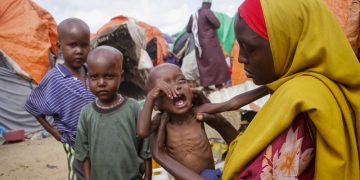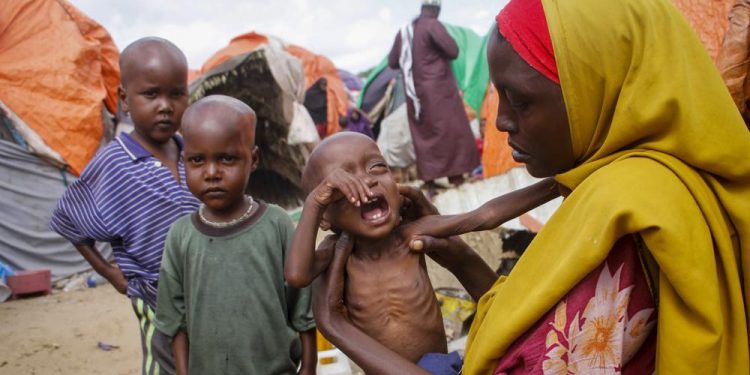By Enyichukwu Enemanna
The United Nations has warned that with the current drought in Somalia coupled with the Russia war in Ukraine, there are “concrete indications” famine will occur later this year in the southern Bay region of Somalia.
UN humanitarian chief Martin Griffiths during his visit to Somalia where he witnessed starving and hungry babies too weak to cry, told reporters that he was “shocked to my core these past few days”.
At least 1 million people in Somalia have been displaced by the worst drought in decades, driven by climate change, that also affects the wider Horn of Africa including Ethiopia and Kenya.
Famine is the extreme lack of food and a significant death rate from outright starvation or malnutrition combined with diseases like cholera.
A declaration means data shows more than a fifth of households have extreme food gaps, more than 30% of children are acutely malnourished and over two people out of 10,000 are dying every day.
Russia’s invasion of Ukraine has been described as a disaster for Somalia, which has suffered from a shortage of humanitarian aid as international donors focus on Europe. Somalia also sourced at least 90% of its wheat from Russia and Ukraine before the war and has been hit hard by scarcity and the sharp rise in food prices.
“Ukraine has occupied the narrative,” Griffiths said.
Hungry families in Somalia have been staggering for days or weeks on foot through parched terrain in search of assistance. Many bury family members along the way. Even when they reach camps outside urban areas, they find little or no help.
At one camp outside the capital, Mogadishu, Fadumo Abdi Aliyow showed The Associated Press the graves of her two small sons next to their makeshift home. Disease had overwhelmed their weakened bodies. One was four. The other was eight months old.
“I wanted to die before them so they could bury me,” Aliyow said. Another resident of the camp of 1,800 families, Samey Adan Mohamed, said the last meal she and her eight children had was rice a day ago. Today they had only tea.
Camps like theirs are ringed by death, bringing aid workers to tears. “I couldn’t get out of my head the tiny mounds of ground marking children’s graves,” UNICEF’s deputy regional director Rania Dagash said last week. “I’m from this region and I’ve never seen it so bad.”
A formal famine declaration would bring desperately needed funding. But “tragically, by the time a famine is declared, it’s already too late,” the UN World Food Program has said.




































